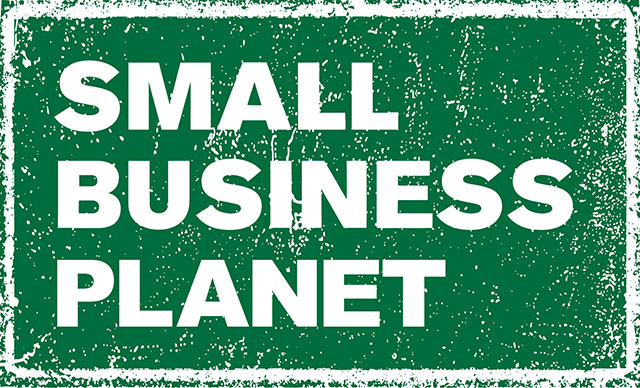When people say innovation is the solution to global warming, what they really mean is that entrepreneurs are the solution to global warming.
Small and medium-sized enterprises (SMEs) are at the forefront of saving the environment.
We have a huge part to play in the race to rein in our global greenhouse gas emissions; to keep global temperatures from rising more than 1.5°C in the next ten years, per IPCC recommendations.
But, what does being a sustainable business means?
A sustainable business makes a minimal negative impact or potentially a positive effect on the global or local environment, community, society, or economy.
It is a business that strives to meet the triple bottom line; People, Profit, Planet.
As small businesses, we should pay attention. Expectations from consumers are increasing, and they demand transparency on our environmental and social impact.
Professional communications and good intentions are no longer enough. Our customers want to do business with ethical brands, and if we take the lead, we will not only support the health of our planet but be rewarded financially.
Want to know where to begin?
Here are 7 ways your small business can work more sustainably.
- Breed Sustainability into your business
- What is your mission and your core values, and do they align with your sustainability goals?
- Why do you care about being sustainable? Identify why this matters to you.
- Talk about your sustainability objectives with your staff, clients/customers and suppliers.
By sharing your sustainable business journey, you can hold yourself accountable and inspire others to join you.
- Offer remote working to reduce travel
- Work from home when possible.
- Consider how you may incentivise staff to think more about their travel EG. Subsidised bus passes or benefits for cycling etc.
- Limiting the need to travel at all by hosting video conferences & meetings.
- Encourage your employees to take alternative, green transport instead of flying.
Did you know that Air travel accounts for up to 25% of the CO2 footprint of international companies? Offering alternative, greener transport methods (e.g. the train) is one way to prevent CO2 emissions from air travel.
- Use Sustainable products
- Paper, cleaning products or to-go containers - these can all be bad for the environment due to the processes that make them. When purchasing rolls of toilet paper and reams of printer paper, look for labelling that says it is made from post- or pre-consumer waste.
- Seek out recycled products that maintain a circular economy and reduce overall waste.
- For cleaning products, Go for (eco!) cleaning sprays and cloths over cleaning wipes, wet wipes. We love @cheekywipes and @wearegather_uk.
BEWARE: Research from the Marine Conservation Society recently found that 40% of green claims by brands are not backed by science. Unfortunately, some brands use words like 'eco', 'sustainable' and 'natural' without any supporting evidence. Use of the colour green, and images of plants, reinforces the message so ensure you are a savvy consumer and check the labels.
Choose sustainable packaging
For businesses that sell a pysical product packaging must be considered. Your packaging and shipping materials add up quickly. A first step might be to choose 100% recycled plastic (rPET) for your packaging and aiming to keep plastic in a closed-loop system.
Good to know: 64 percent of consumers would be more likely to purchase from a retailer that offered compostable packaging.
Involve your team
Getting your team members involved by introducing fun initiatives that both educate and encourage participation. Some fun ideas include:
- MeatFree Mondays
- Day Plastic Free Challenges
- Reuse, reuse, recycle incentives
- Plant a tree to celebrate team members birthdays
- Organise Beach & Park cleanups
- Talk about it on your social media & website
- Put a sustainable leadership team in place. (These people can plan events, increase awareness and lead others in a passion for improving green living.)
Offset CO2 emissions
Businesses can invest in CO2 reduction projects EG. Planting trees, investing in solar projects and rescuing food waste. By monitoring both our individual and business carbon footprint and taking steps to shrink them down, we can help slow and ideally reverse the effects of climate change.
Some of our favourite 'giving' platforms include:
Every company has a different level of impact on the planet, but we all contribute to climate change, pollution and the waste crisis. Committing to offset emissions while you plan and work towards reducing your overall carbon footprint is a brilliant first step.
Become Accredited
Planet Mark and B-Corp are two brilliant ways to get recognised for your commitment to Sustainability.
Planet Mark
Planet Mark certified businesses make a 12% cut in absolute carbon emissions per year, 16% carbon saving per employee per year through reductions in energy, waste, water, travel and procurement.
99% of their members achieve their targets to renew their certification year-on-year. Every business that becomes certified through the programme protects an acre of rainforest through our partnership with Cool Earth.
B-Corp
Certified B Corporations are businesses that meet the highest standards of verified social and environmental performance, public transparency, and legal accountability to balance profit and purpose. TheeThe perfect time to become a B Corp is when your business is still growing. It provides a framework to help balance the need to make a profit with the planet's needs.
Deciding to become accredited also allows you access to a network of other businesses that are always willing to offer advice based on their experience.
Being a Sustainable business is about how we, as small businesses, commit to a set of values underpinned by behaviours, which provides a business plan that serves both our customers and our beautiful planet.
Which of the 7 ways mentioned above can you implement today?
Visit WebsitePublished: 27 May 2021
